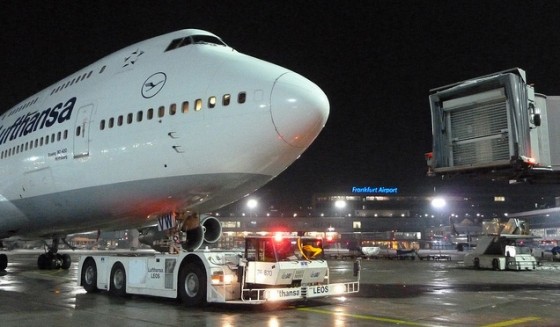 TaxiBot, A unique towing system for airplanes to save jet fuel will save billions of tons of greenhouse gases.
TaxiBot, A unique towing system for airplanes to save jet fuel will save billions of tons of greenhouse gases.
The idea has been around for a while, but engineers weren’t able to make it work. At least as far as Israel Aerospace Industries (IAI) knows, the Taxibot Dispatch Towing system is the world’s first tugboat-like way to tow both wide and narrow body commercial airplanes to taxi to and from the gate and the runway without the use of their jet engines.
Consider that a Boeing 747 can burn through a ton of jet fuel for every 17 minutes it’s taxiing: I spoke with the project leader at IAI, and I learned how the TaxiBot can save billions of dollars of runway fuel, and greenhouses gases.
Instead of running the engine as the plane taxis to the runway — and if you’ve ever been stuck sitting in a plane on the runway for three hours, you know the problem all too well — jets outfitted with Taxibot won’t have to turn on the engine until minutes before takeoff.
Developed and tested in a joint venture with Airbus, the environmentally friendly semi-robotic towing system could potentially reduce annual fuel costs from $8 billion to less than $2 billion, carbon dioxide emissions from 18 billion tons to less than two million tons per year and noise emissions by a significant margin.
“This is an outcome of the very innovation process we are doing at IAI,” says Ran Braier, Taxibot project director and civil robotics director in the company’s Lahav Division. He notes that a team of about 26 people, mostly engineers, worked on building the Taxibot.
When designing Taxibot, IAI needed to recognize that pilots were not about to relinquish control over the taxiing process, Braier explains to ISRAEL21c.
“The pilot is the only person who is allowed to be in control of passenger jets because the human factor is one of the greatest causes for accidents. One of the weaknesses [in the link] is the change of responsibility between humans,” he says.
Bottom line: Any towing system must be designed with its controls in the cockpit.
The engineers at IAI also had to jump another major hurdle: Previous attempts at taxiing systems produced too much wear and tear on the nose landing gear, causing breakdowns. Taxibot has been designed to overcome this problem.
“We have a lot of mechanisms that are maintaining the load envelope in real-time, in a way that it doesn’t affect the landing gear,” Braier says, describing in aviation terms how the innovative control system of the Taxibot works.
The company recently announced a series of successful trials with Lufthansa on a Boeing 747 in Germany, and on an Airbus in Toulouse, France. Lufthansa is a likely first customer, and interest has been expressed by US Airways in Philadelphia.
The business model is flexible. The Taxibot could be owned by the airline, provided as a service by the airport, or owned and operated by privately held ground-crew companies.
With an estimated cost of about $3 million each, the company aims to sell some 1,500 Taxibots by the year 2020. The return on investment for airlines buying the device directly is expected to be quite rapid — less than two years, depending on the size of the plane.
During trials, IAI showed how the aircraft’s pilot can steer the plane to the runway using tiller and braking pedals like those used in regular airplane taxiing. “The overall impression is very good, and better than I expected. Steering the aircraft using the Taxibot with all kinds of turns was absolutely to my liking in addition to the accelerating and braking capabilities that were good,” says Lufthansa pilot Bernd Pfeffer stated in his evaluation
Read more on greening airplanes:
Aqua Soft’s Drone Plane Collects Water from the Air
Tooth Enamel Inspires Thinner, Lighter Planes
Israel Company IAI to Make Cleaner, Quieter Aircraft
Etihad and Qatar to Make Greener Aircraft
Join The Great Airways Debate Part I
The Great Airways Debate Part II
Will Tel Aviv Airport Be First Middle East Airport To Fly Green?
::Read the whole story on ISRAEL21c



